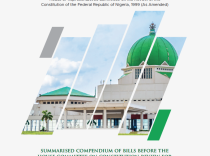The Senate has begun consideration of the report of its Committee on Independent National Electoral Commission (INEC) on a bill for an Act to amend the Electoral Act, No. 6 2010 and for other related matters. The report laid by the committee was in respect of Electoral Act, No 6, 2010 (Amendment) Bill, 2016 (SB. 231) sponsored by Sen. Tijani Kaura (APC:Zamfara) and an Independent National Electoral Commission Bill, 2016 (SB. 234) sponsored by Sen. Ubali Shitu (APC:Jigawa). Both bills were read for the second time at its plenary sitting on 17th March 2016 and referred to the committee for further input.
Presenting the report on Wednesday, 2nd November, 2016, Committee Chair, Sen. Abubakar Kyari (APC:Borno) commended the bill’s sponsors for their attempt to cure mischiefs identified in the electoral system. In his words, their “initiative touched squarely on the Senate’s Legislative Agenda on comprehensive Electoral Reform”. He mentioned that the objective of the Senate’s agenda on Electoral reform is to update, clarify and strengthen electoral laws to respond adequately to current and evolving challenges in the national socio-political space. He also stated that a comprehensive electoral reform would help INEC deliver greater efficiencies and lead to transparent, credible and generally acceptable electoral outcomes having multiplier effects on good governance.
Sen. Kyari then went on to explain that both bills had intended to make six (6) amendments to the Electoral Act. For instance, while SB. 231 was targeted solely at improving the processes of voter accreditation using the Smart Card Readers (SCRs), SB. 234 intended to make the five (amendments) listed below:
- Criminal penalty for a member of a political party who misrepresents his status for the purpose of being engaged in INEC;
- Replacement of a candidate at an election who dies between commencement of polls and declaration of result of the election;
- Proceeding with an election where there is only one valid nomination;
- Criminal penalty for obtaining registration of a political party fraudulently and granting INEC power to overrule manipulation of results.
However, the Chairman added that the Committee had come up with a single enriched bill with proposed amendments to 25 sections of the Electoral Act, including insertions of sections. He explained that the recommendations in the report had been arrived after holding several meetings including a Summit on Elections where it held broad based public consultations and examined major issues canvassed. He also mentioned that the Committee was aided by a team of Technical experts and legal draftsmen to come up with a harmonized Bill for presentation to the senate. The report contained the following six (6) recommendations:
- An amendment of section 8 of the Electoral Act by inserting a new subsection (5) that prescribes imprisonment for at least 5years or a fine of at least Five Million (N5, 000,000) for a political party guilty of misrepresenting himself to sure an appointment with INEC
- An amendment to section 36 by inserting a new subsection which provides for the substitution of a candidate of a political party who dies before the declaration of the result of an election with the first runner up in the party’s primaries
- Amending section 38 of the Electoral Act as it is in conflict with sections 132(3) and 178(3) of the 1999 Constitution (as amended).
- An amendment to section 49 to enable the use of Smart Card Readers and other technological devices for elections by INEC.
- An amendment to subsection 78(5) of the Electoral Act with regard to false and misleading information by an association to INEC for the purpose of registering a political party.
- Amending section 87 of the Electoral Act and substituting for the existing section, a new section 87 Section 87 provides for direct primaries in nominations of candidates elective positions.
The Chairman also mentioned that majority of issues expressed at the Summit on Elections required constitution amendments and that therefore the committee recommended their referral to the Constitution Review Committee for consideration and further action. Some of the major issues canvassed at the Summit included proposed amendments to sections 65 (2)(b), 106 (d), 131 (c) and 177 (c) with 142 (1) and 122 of the Constitution, with respect to independent candidacy; amendment to section 285 of the Constitution on timelines for the determination of election petitions and appeals arising from them and the amendment to section 174 (c) of Constitution for the AGF’s power of nolle prosequi not to be exercisable in respect of electoral offences since his powers should be preserved and exercised against offenders in full measure among others. The report suggested that there should be further study on the matter of diaspora voting and voting by prisoners in respect of logical challenges. Additionally, it recommended further study on the question on whether electoral officials and security personnel officials could vote given the statutory demands of neutrality imposed under section 28 of the Electoral Act.
The Senate thereafter moved to consider the report clause by clause. However, further consideration of the bill stalled when lawmakers failed to arrive at a consensus on the procedure where a nominated candidate for an election dies after the commencement of poll but before the announcement of final result (that is the proposed section 36). While some Senators felt it was proper for the political party to substitute the deceased with the person who scored the next highest number of votes at the party primaries, others felt it was only logical that his running mate takes his slot. Sen. Danjuma Goje (APC:Gombe) for instance, mentioned that the issue of zoning within the political party would pose a challenge to the proposal of a running mate taking the slot of the deceased as the nominated candidate. However, Sen. Eyinnaya Abaribe (PDP:Abia) canvassed that the running mate of the deceased should take his place as the nominated candidate of the party since they were running on a joint ticket and that doing otherwise would worsen the issue by creating gaps. This amendment is to address the issue of the recent incidence in Kogi state where a candidate died before the final result of the governorship election was announced.
Senate President, Bukola Saraki (APC:Kwara), has mandated the Committee on INEC to carry out further legislative work in a bid to resolve the matter and make provisions regarding where a candidate is unopposed at party primaries.
Click here to download the report>>>




